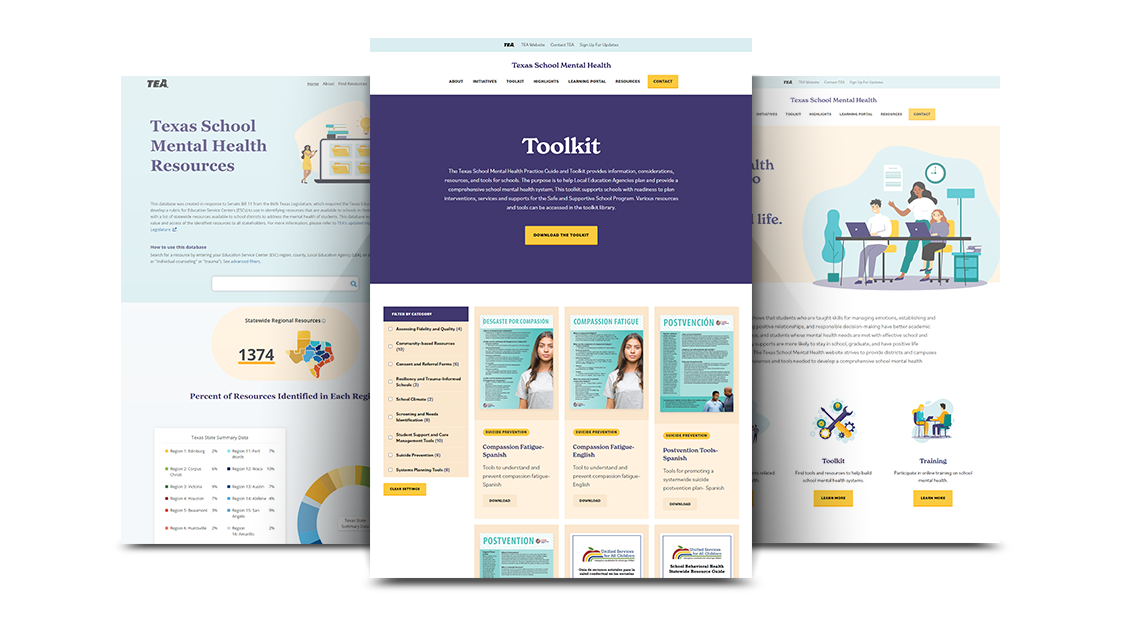
Mental health has a substantial effect on student academic performance. As the need for mental health resources in Texas significantly outpaces availability and access, schools are often the best location for students to connect with necessary mental health services and community support.
The Texas Education Agency and its partners, including the Region 14 Comprehensive Center, are building statewide school-based mental health supports to ensure students, families, schools, and districts can access the tools and resources necessary to effectively address mental and behavioral health needs.
Driving Forces
In 2019, the Texas Legislature passed multiple bills to increase availability and access to mental health resources for students and families across the state. The Texas Education Agency (TEA) was made responsible for coordinating data collection, training educators, and reporting findings related to school mental health resources. As part of a collective strategy emerging from this legislation, TEA recognized an opportunity to enhance existing work streams, expand current partnerships, and build new school supports.
“Increasing awareness of what mental health means and the resources and information available for students and families is critical,” Julie Wayman, Director of Mental and Behavioral Health in the TEA Supportive Schools Division, said. “Before the passage of these bills, mental health literacy was nonexistent on a large scale.”
Cross-Agency Partnerships
TEA was already engaged in significant work in student mental health through a Project AWARE grant and routine engagement with the 20 regional Education Service Centers (ESCs) throughout the state to provide training and professional learning opportunities.
“To build integrated services for students and schools, we sought partners working on similar initiatives,” Julie Wayman said. As a result, TEA partnered with the Texas Health and Human Services Commission (HHSC), South-Southwest Mental Health Technology Transfer Center (SSW MHTTC) at the University of Texas (UT) at Austin, Texas Institute for Excellence in Mental Health (TIEMH) at UT Austin, and the Region 14 Comprehensive Center (R14CC).
Building Tools and Resources
R14CC collaborated with TEA and its partners to comprehensively support school, district, regional, and state collaborators.
Texas School Mental Health Database
In 2021, R14CC and TEA worked with the 20 regional ESCs to design a database to streamline mental health resource data collection, better validate data quality, and publish publicly searchable results. In April 2022, the Texas School Mental Health Database launched, allowing more than 12,000 users to date to search for available resources within their region, county, and school district. R14CC and TEA collected user feedback after the launch and noticed a need for more accuracy in searching by geographic area. In September 2023, a refined search platform was introduced, and positive feedback was received from ESC users.
Texas School Mental Health Practice Guide and Toolkit
R14CC joined collaborators from TEA, HHSC, and the SSW MHTTC at UT Austin to contribute to creating the Texas School Mental Health Practice Guide and Toolkit. The final product includes a statewide framework for school mental health, 47 tools, samples and templates, and comprehensive information to help practitioners implement the framework.
Texas School Mental Health Website
R14CC provided feedback on the new Texas School Mental Health Website, created and hosted by TEA’s Project AWARE partner UT Austin, and the forthcoming Safe and Supportive School Programs virtual training modules collectively developed by TEA's Project AWARE partners.
Collaborative Task Force on Public School Mental Health Services Legislative Report
House Bill 906 created a new Collaborative Task Force on Public School Mental Health Services, which TEA administers. R14CC provided support as the task force worked on its required legislative report, including designing high-quality focus groups and facilitating member training as part of data collection activities.
Lessons Learned
After 4 years of working together, R14CC, TEA, and its partners have learned several critical lessons integral to the continuous improvement of our collective actions and have supported the needs of Texas students. These lessons will inform our future efforts and can be helpful for other SEAs.
Sustainable Foundations
Constructing robust structural supports for schools and districts lays the foundation for sustaining initiatives. It also acts as a framework for ongoing improvement and customization to cater to the unique needs of local communities. Imagine these supports as the scaffolding that ensures the durability and adaptability of educational initiatives. Take, for instance, the collaborative efforts with TEA; they seek user feedback on the Texas School Mental Health Practice Guide and Toolkit to increase access and enhance its effectiveness for regional and district staff. TEA aims to update the toolkit based on real-world experiences and insights in the spirit of continuous improvement. TEA is committed to expanding training opportunities and participating in policy discussions during the 2025 legislative session. These actions are crucial steps toward informing policymakers of the progress made and presenting innovative ideas to sustain and improve access to quality school mental health.
R14CC is working with TEA to enhance the mental health resource database by developing an interactive map allowing users to view the distribution of resources by geographic locations such as school districts, counties, and ESC regions. This mapping function will be completed by September 2024 and continues to support TEA’s statewide goal to expand knowledge of and access to school-based mental health resources.
As the current host of the Texas School Mental Health website, UT Austin was identified as the custodian of the database once the R14CC cooperative agreement was fulfilled. This marks a significant step in ensuring the longevity and security of the collaborative efforts. This aligns seamlessly with the enduring elements of TEA's work over the past 4 years, including Professional Learning Communities (PLCs), the development of toolkits, and the establishment of a statewide plan for mental health. These elements form the bedrock of the collaborative initiative.
They also testify to the commitment to long-term impact and sustainability in mental health across Texas. The tools and resources generated through this partnership are not just building blocks. They catalyze the state toward a future of continuous progress and excellence in school mental health.


